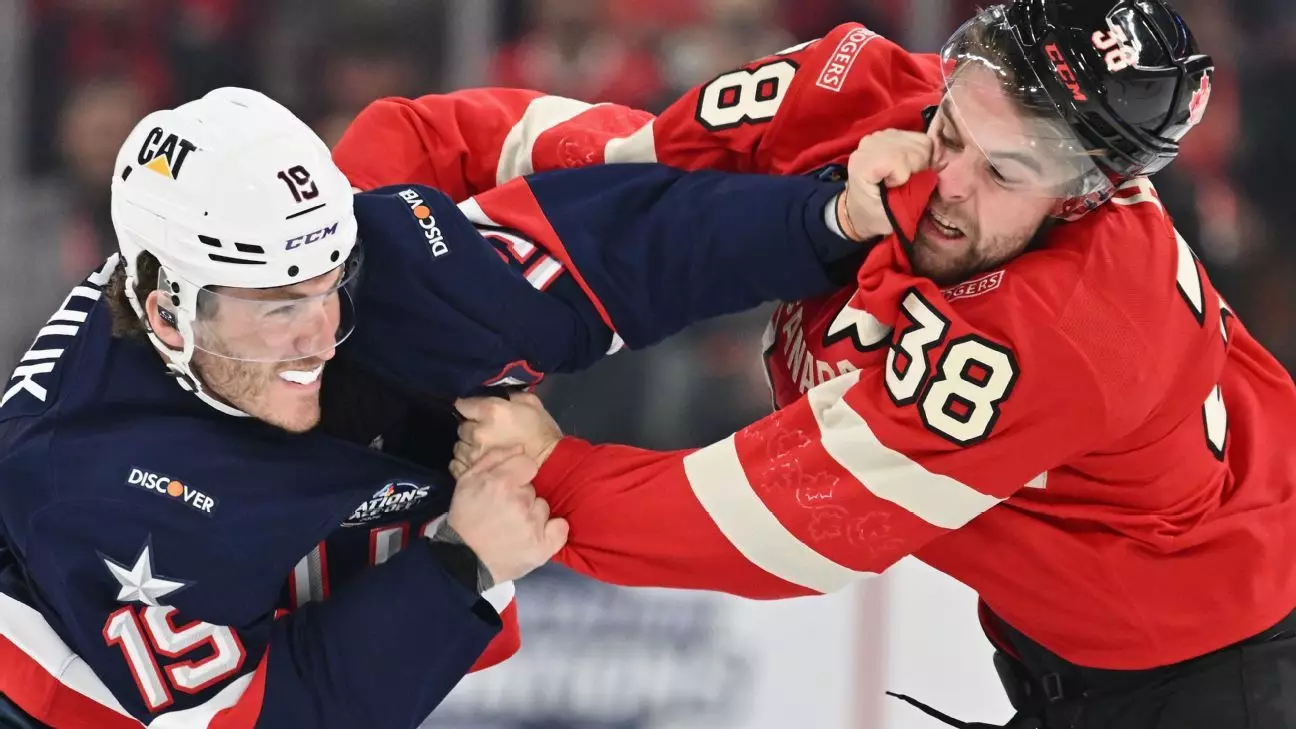This past Saturday evening marked an unforgettable chapter in the NHL 4 Nations Face-Off as Team USA delivered a thrilling 3-1 victory over Team Canada, igniting a significant conversation about the future of hockey. Canada’s coach, Jon Cooper, displayed a mixture of disappointment and appreciation following the high-stakes encounter. “The game is in a better place because last night’s game existed,” he remarked, emphasizing the profound effect such intense competition can have on the sport. The encounter drew a remarkable audience, with a peak of 5.4 million American viewers witnessing this first “best on best” matchup since 2016.
The backdrop to the game was not only the on-ice drama but also the off-ice tensions stemming from political undercurrents, notably protests against tariffs imposed by Donald Trump’s administration. As the national anthem played, Montreal fans audibly expressed their dissent, setting a charged atmosphere that spilled over into the game almost immediately. The pre-game sentiment burst into chaos with a record-setting three fights occurring within the first nine seconds, an unforeseen yet electrifying beginning to a match charged with emotion and rivalry.
The intensity was palpable from the opening face-off, where players from Team USA—including Matthew and Brady Tkachuk as well as J.T. Miller—engaged in a bout that sparked exhilaration among fans. Not only did Matthew Tkachuk’s fight set a new record for the fastest fight in an international NHL game, surpassing a 20-second engagement from decades past, but it also exemplified how the players fed off the fans’ energy. Jesper Bratt of Team Sweden subsequently described the atmosphere as “electric” as the arena reverberated with cheers and expressions of loyalty and rivalry.
The emotional fervor of the game encapsulated the essence of hockey: a sport where physicality entwines with artistry, and the stakes feel as high as any playoff series. The atmosphere transformed into a showcase of national pride and personal rivalry, attracting attention beyond the usual hockey fan base. Travis Konecny of Canada pointed out the unique physicality of the sport that still includes fighting, emphasizing that it plays a role in elevating the rivalry.
Cooper addressed the contentious issue of fighting in hockey, acknowledging that opinions are divided. He lauded the physical confrontations for igniting the passion of the game, leading to an exhilarating display of skill and determination. “When you get the best players in the world not only trying to score but throwing checks, this is the kind of drama you create,” he stated. In a world where other sports lean increasingly toward non-physical competition, hockey retains an element that creates excitement and unpredictability.
Interestingly, many players, including Jack Hughes of Team USA, noticed the far-reaching ramifications of the game on public perception. With hockey often overshadowed by other major sporting events, witnessing high-intensity rivalries played out like this not only reignited passion among the fans but could also have implications for drawing in a new generation of players. Vincent Trocheck, an NHL player noted for his analytical acumen, expressed that the fervor displayed in this game could never be matched by the often lackluster nature of All-Star Games, emphasizing that this competition feels more akin to the pressure of playoff hockey.
As the 4 Nations tournament continued to unfold, the impact of the USA versus Canada game became a central talking point. Coaches and players from other teams in the competition expressed admiration for the level of competition and emotional stakes involved. Sam Hallam, Sweden’s head coach, pointed to the historical context of this rivalry, noting its significance within the broader landscape of international hockey.
Erik Haula of Finland echoed this sentiment, recognizing that moments like these represent what hockey is all about—passion, skill, and national pride. The implications of this match extend far beyond the scoreboard, reflecting what it means for players and viewers alike. Coach Mike Sullivan perceives the potential inspiration this game holds for future hockey stars, drawing parallels to monumental moments like the Miracle on Ice.
As the tournament progresses, the imminent rematch with Canada could amplify this sentiment further. The upcoming games promise the possibility of stirring rivalries that continue to define hockey culture in profound ways. With the world watching, it’s clear that games like the recent USA-Canada battle encapsulate more than just a competition for victory; they serve as a celebration of a sport deeply embedded in the fabric of national identity.


Leave a Reply